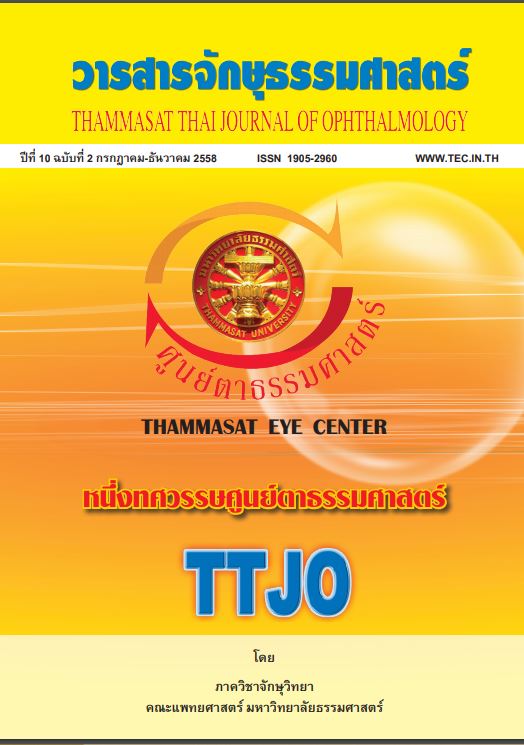ปัจจัยที่มีผลต่อการตัดสินใจเลือกศึกษาต่อเฉพาะทางด้านจักษุวิทยาของบัณฑิตแพทย์ มหาวิทยาลัยธรรมศาสตร์
Main Article Content
Abstract
บทคัดย่อ
วัตถุประสงค์ เพื่อศึกษาถึงปัจจัยสำคัญที่มีผลต่อการตัดสินใจเลือกศึกษาต่อเฉพาะทางด้านจักษุวิทยาของบัณฑิตแพทย์ มหาวิทยาลัยธรรมศาสตร์
วิธีการวิจัย เก็บข้อมูลโดยใช้แบบสอบถามกับบัณฑิตแพทย์ มหาวิทยาลัยธรรมศาสตร์ จำนวน 56 คน ในวันปัจฉิมนิเทศของคณะแพทยศาสตร์ มหาวิทยาลัยธรรมศาสตร์
ผลการวิจัย จากการตอบแบบสอบถามของบัณฑิตแพทย์ มหาวิทยาลัยธรรมศาสตร์ จำนวน 56 คน ประกอบด้วย ชาย 23 คน (41.07%) หญิง 33 คน (58.92%) มีภูมิลำเนาที่กรุงเทพ/ปริมณฑล 14 คน (25%) ภาคกลาง 17คน (30.36%) ภาคตะวันออกเฉียงเหนือ 1 คน (1.8%) ภาคตะวันออก 9 คน (16.07%) ภาคใต้ 15 คน (26.78%) มีความต้องการที่จะปฏิบัติงานในฐานะจักษุแพทย์ที่ภาคกลางมากที่สุด เป็นจำนวน 20 คน (35.71%) ผู้ที่ต้องการเรียนต่อเฉพาะทางจำนวน 55 คน (98.21%) ในจำนวนนี้มีความต้องการเรียนต่อเฉพาะทางด้านจักษุวิทยา 16 คน (28.57%) เหตุผลส่วนใหญ่ที่เลือกเรียนคือ คิดว่างานทางจักษุวิทยาเป็นงานที่สะอาด 12 คน (21.42%) ส่วนเหตุผลที่ไม่เลือกเรียนคือ คิดว่าเป็นสาขาที่มีอัตราแข่งขันสูง เป็นจำนวน 29 คน (51.78%) แพทย์ที่ถนัดในการผ่าตัด 24 คน ต้องการเรียนจักษุวิทยา 10 คน (41.66%) ไม่ต้องการเรียนจักษุวิทยา 14 คน (58.33%) ส่วนแพทย์ที่ไม่ถนัดในการผ่าตัด32คน ต้องการเรียนจักษุวิทยา 6 คน (18.75%) ไม่ต้องการเรียนจักษุวิทยา 26 คน (81.25%)
วิจารณ์ บัณฑิตแพทย์ มหาวิทยาลัยธรรมศาสตร์ ส่วนใหญ่มีภูมิลำเนาอยู่ภาคกลาง มีความต้องการศึกษาต่อเฉพาะทางค่อนข้างมาก แต่เฉพาะทางจักษุวิทยายังเป็นสัดส่วนค่อนข้างต่ำ เนื่องจากยังคิดว่ามีอัตราการแข่งขันสูงทั้งในด้านสถานที่เรียน จำนวนตำแหน่งที่รับที่ค่อนข้างน้อย
สรุปผลการวิจัย ปัจจัยหลักที่ทำให้บัณฑิตแพทย์ มหาวิทยาลัยธรรมศาสตร์ตัดสินใจเลือกศึกษาต่อเฉพาะทางด้านจักษุวิทยาคือ แนวคิดที่ว่างานทางจักษุวิทยาเป็นงานที่สะอาด และปัจจัยที่ทำให้บัณฑิตแพทย์มหาวิทยาลัยธรรมศาสตร์ไม่ตัดสินใจเลือกศึกษาต่อเฉพาะทางด้านจักษุวิทยาคือ อัตราแข่งขันที่สูง ส่วนความถนัดทางการผ่าตัดไม่ใช่ปัจจัยสำคัญในการตัดสินใจเลือกศึกษาต่อ
Factors Affecting Decision to Specialize in Ophthalmology of Graduated Medical Students at Thammasat University
Objective:
To study the factors which influence the decision making in continuing ophthalmology training of medical graduates from Thammasat university.
Methodology:
This cross-sectional study was conducted by questionaires on post training day of medical graduates.
Results:
Fifty six medical graduates of Thammasat university were recruited. Female (33 graduates, 58.92%) was predominant. Their hometowns were in Bangkok and surroundings (14, 25%), central region (17, 30.36%), north-eastern part (1, 1.8%), the east (9, 16.07%), and the south (15, 26.78%). Most of medical graduates (20, 35.71%) desired to work as ophthalmologists in central region of Thailand. Fifty five graduates (98.21%) willed to continue residency training and sixteen ones (28.57%) interested in ophthalmology. Main reason of selecting was the cleanliness of work (12, 21.42%) and the reason of non-selection was the high competition (29, 51.78%). Among 24 surgically skillful ones, 10 persons (41.66%) interested in ophthalmology and 14 persons (58.33%) disinterested. Among 32 unskillful ones, 6 persons (18.75%) interested in ophthalmology and 26 persons (81.25%) disinterested.
Discussion:
Medical graduates of Thammasat university mostly lives in the central region of Thailand and markedly interested in continuing residency training. Ophthalmology was less concerned due to high competitive rate, small number of training centers and limited positions.
Conclusions:
The main factor of interest in ophthalmology training was the clean work and of the disinterest was highly competitive rate. The surgical skill was not the important factor in continuing study.
Article Details
References
Knox KE1, Getzin A, Bergum A, McBride P, Rieselbach R, Friedsam D. Short report: factors that affect specialty choice and career plans of Wisconsin's medical students. WMJ. 2008 Dec;107(8):369-73.
Borges NJ1, Manuel RS, Duffy RD, Fedyna D, Jones BJ. Influences on specialty choice for students entering person-oriented and technique-oriented specialties. Med Teach. 2009 Dec;31(12):1086-8.
Lynch DC1, Newton DA, Grayson MS, Whitley TW. Influence of medical school on medical students' opinions about primary care practice. Acad Med. 1998 Apr;73(4):433-5.
Dikici MF, Yaris F, Topsever P, Tuncay Muge F, Gurel FS, Cubukcu M, Gorpelioglu S. Factors affecting choice of specialty among first-year medical students of four universities in different regions of Turkey. Croat Med J. 2008 Jun;49(3):415-20.


